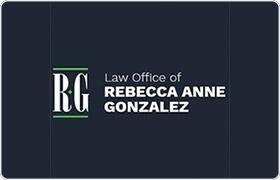 Mc Queeney Family Law Lawyers, Texas
Mc Queeney Family Law Lawyers, Texas
Sponsored Law Firm
-
 x
x

Click For More Info:
-
Law Office of Rebecca Anne Gonzalez
10101 Reunion Place Suite 615 San Antonio, TX 78216» view mapDivorce & Family Law Continuing The Gonzalez Legacy
At the Law Office of Rebecca Anne Gonzalez, my goal is to make certain you feel taken care of. My team and I work hard to protect what is important to you.
800-735-1530
Includes: Collaborative Law, Domestic Violence & Neglect, Paternity, Prenuptial Agreements
Lawyers
1-4 of 4 matches
Construction, Family Law, Elder Law, Administrative Law, Agribusiness
Personal Injury, Family Law, State Appellate Practice, Litigation
Personal Injury, Credit & Debt, Family Law, Litigation, Construction



 Rebecca Gonzalez San Antonio, TX
Rebecca Gonzalez San Antonio, TX Practice AreasExpertise
Practice AreasExpertise